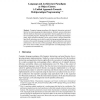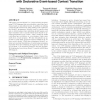1776 search results - page 16 / 356 » Using a Logic Programming Language with Persistence and Cont... |
113
click to vote
PLSA
1994
15 years 6 months ago
1994
Computer language paradigms offer linguistic abstractions and proof theories for expressing program implementations. Similarly, system architectures offer the hardware abstractions...
211
Voted
ASPLOS
2011
ACM
14 years 6 months ago
2011
ACM
nt, user-defined objects present an attractive abstraction for working with non-volatile program state. However, the slow speed of persistent storage (i.e., disk) has restricted ...
209
click to vote
ENTCS
2007
15 years 2 months ago
2007
Computing with failures is a typical programming technique in functional logic programs. However, there are also situations where a program should not fail (e.g., in a determinist...
208
click to vote
AOSD
2011
ACM
14 years 9 months ago
2011
ACM
This paper proposes EventCJ, a context-oriented programming (COP) language that can modularly control layer activation based on user-defined events. In addition to defining cont...
111
Voted
CLIMA
2007
15 years 4 months ago
2007
Abstract. Failures are unavoidable in many circumstances. For example, an agent may fail at some point to perform a task in a dynamic environment. Robust systems typically have mec...


